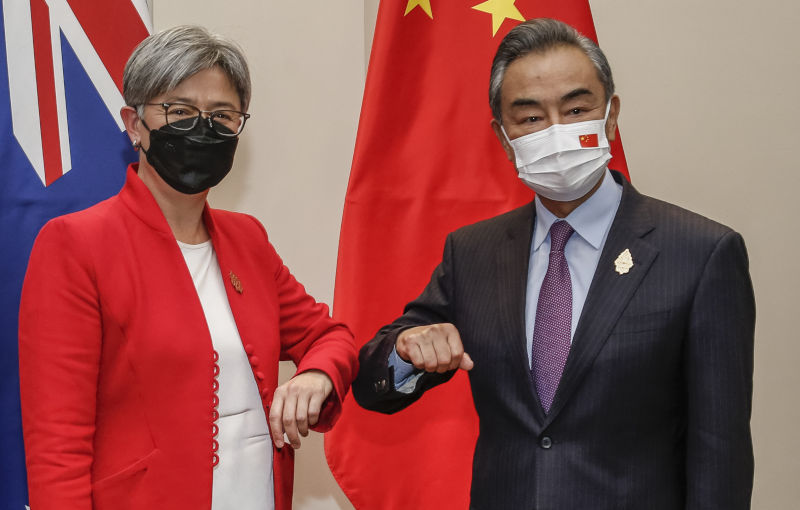
Beijing and Canberra remain deadlocked in a trade war. But there is a step-by-step means for both parties to climb down gracefully.
Tiny green shoots are beginning to appear in the Australia-China relationship. Foreign Minister Penny Wong’s meeting with her Chinese counterpart – the second in two months – on the margins of the UN General Assembly session is the most recent.
The change from winter to spring is initially almost imperceptible, other than to a gardener’s trained eye. Last year, China’s deputy ambassador, Wang Xining, fronted a hostile National Press Club in Canberra. His tone was conciliatory, the audience’s was not. Beijing then appointed senior diplomat Xiao Qian, cross-posted from Jakarta, as its new ambassador to Australia.
The significance of his appointment has been lost on Australia. In Beijing’s view of the world, Canberra is a second-order posting compared with Jakarta. However, his appointment was not a demotion. A highly experienced diplomat, fluent in English, was sent with the task of steering the relationship back to a more constructive place. No one in Canberra seemed to notice.
Since his arrival, Xiao has fronted the Press Club, to the usual impolite hostility. He again used measured diplomatic and respectful language. ‘‘Wolf warrior’’ diplomacy is consigned now to a list of bad ideas. His comments on Xinjiang and Taiwan may not be what the Press Club gang wanted to hear but, just like Australian diplomats, he represents his government’s position and says what he is paid to say.
He then appeared on the ABC’s 7.30 news show and spoke in a conciliatory tone. He even offered some hope that the imprisoned Australian journalist Cheng Lei might be allowed to speak with her children. And foreshadowed his wish (read Beijing’s) that a meeting might occur between Anthony Albanese and President Xi Jinping on the margins of one of the summits being held later this year. He thought that would be possible if Australia also contributed to warming the atmosphere a little.
The Australian position is largely stuck with the brief prepared for the Morrison government. We know the chant by heart: It is all China’s fault, they changed, we didn’t, it is up them to behave differently, we’re not going to give up on our values and won’t be pushed around, and so on.
Yes, China has in recent years behaved more assertively, abrasively and confrontationally, and took some massively counterproductive actions, including sanctions on a number of Australian exports. These have all been own goals.
But Australia has not been sitting on its hands. It has had ASIO and the Australian Federal Police harass Chinese journalists in Australia, removed funding from the neutral think tank China Matters for being balanced, used unjustified anti-dumping actions as trade harassment, denied visas to certain academics before the pandemic, disrupted university exchanges, and more.
The then-treasurer made it clear to China that its investments in Australia are not welcome, with some stupid decisions such as by blocking a Chinese dairy firm from acquiring a Japanese-owned firm on national security grounds. This was just another case of the former government subsuming the national interest to internal Liberal Party politics. China’s investment into Australia has all but collapsed.
Rounds of tit-for-tat retaliation by both sides brought the relationship to its nadir towards the final phase of the Morrison government. Labor has drawn a line under this, moderated the previous government’s bellicose language, and shown commendable discipline in commenting on China and the bilateral relationship. Remarkably, this has all happened without Australia having to give up its values.
The question, then, is how to warm up the relationship a bit further in order to keep making progress towards a more normal one. Part of the challenge is that some in Canberra do not wish to see that happen.
Wong is cautious to a fault, speaking only of ‘‘stabilising’’ the relationship, not improving it or moving back to a more normal setting. For his part, the prime minister seems more interested in talking about the monarchy than the single biggest foreign policy issue his government faces.
Assuming there is a wish to return to more normal relations, then the biggest immediate obstacles are the trade measures China imposed on Australia’s exports of wine, barley, coal, lumber and lobsters. Beijing’s actions were wrong, but also utterly counterproductive – they hardened attitudes in Australia against China, and now make it much more difficult to improve relations.
Politically, no Australian government can do much to move forward while the measures are in place. Equally, Beijing cannot remove them without it looking like a humiliating backdown. This is made all the more difficult in the current phase of China’s political cycle, with a strong anti-Western narrative running in the lead-up to next month’s Communist Party congress, where Xi will seek to become president forever.
Movement won’t be possible until after the party congress, but both sides should be looking at how this can be done after October. One way that would not involve either side being seen as backing down would be for Australia to drop its cases in the World Trade Organisation over China’s measures against wine and barley in return for China agreeing to restore trade in these products to what existed before 2020.
This could be done quickly by the respective ambassadors advising the WTO director-general that the cases had been resolved through bilateral discussions. Australia could then announce it had a win and restrictions on wine and barley would be removed. China could announce it had a win by having Australia drop its actions against it. Trade henceforth would be conducted based on the bilateral free trade agreement.
This would provide some forward momentum, perhaps enough for a bilateral meeting between leaders on the margins of the G20 summit in Bali. There it could be announced that the remaining measures would be lifted, some anti-dumping by Australia would be reviewed, and that Australia would welcome more Chinese investment, subject to the usual Foreign Investment Review Board processes. A visit to Beijing by Wong could also be announced with a view to preparing for Albanese to visit.
If the will is there to move forward, it can be done. Diplomacy is the art of solving difficult problems without giving way on national interests. Wong has called for a return of diplomacy and for DFAT to resume its place as a central department of state. It is now time to square the circle.




